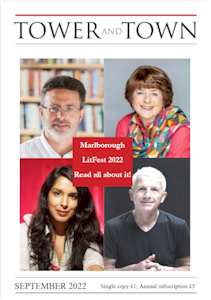

Tower and Town, September 2022 (view the full edition) (view the full edition)Clergy LetterA kind of belonging With the Marlborough Literature Festival coming up soon, I am preparing for my slot in the programme, in conversation with my colleague, Colin Heber-Percy. We shall be speaking about our recently published books, both of which draw on personal experience of parish life, and its deep roots in place. 'Parish' is a bond-word: a covenant with place. Deep roots within Western culture over a remarkably long tenure have meant such absorption of meaning that it serves to express, like no other word in English, our need for a footing in the world, for local attachment. Consequently, the parish idea is not only highly potent - binding secular to sacred, human community to natural landscape - but also problematic and politicised, encapsulating many of the tensions contained in our longing to belong. Evoking an idyll of (usually rural) settlement, the extended form 'parochial' is almost always employed in the derogatory sense of blinkered insularity: the social drawbridge slammed shut. For those watching in dismay at the growth of popular national movements across Europe, the new parochialism is a doubly bad thing, denoting both fear of the outsider and the retrogressive urge to regain some Edenic past. And yet, according to the Irish poet Patrick Kavanagh, 'All great civilisations are based on parochialism 'Greek, Israelite, English...' Continuing that 'it requires a great deal of courage to be parochial', Kavanagh's point is that parochialism involves confidence and pride in the authenticity of local experience, which requires no constant comparison with, or recourse to neighbouring forms of expression. Parish is, after all, the nearby community, and this 'nearness' is the key to most of the perceived blights and benefits of parochial life - its equal suggestion of settled support and suffocating pettiness. That the word has such a painful double edge is due to its unusual blend of associations. In ancient Graeco-Roman society, its original form paroikia described the community of people either living physically beyond city boundaries (literally 'those beside the house') or as non-citizens within the walls. They were those who lived nearby, but didn't quite belong. Not a little ironic, then, that 'parochial' has come to epitomise insularity and self-containment when its original meaning is far closer to our contemporary definitions of stranger or refugee. Its effective transition in meaning, from 'outsiders' to 'insider', came about when the early Christian church adopted 'parish' as a description of their own local organisation. The Christian paroikia were those who didn't belong in a worldly sense, but had found a new kind of ideal home, a heavenly destination. When, in the late sixth century, Roman Christianity returned to Britain with the arrival of Augustine on the Kent coast, this parochial idea came ashore too. Very gradually (only becoming a national 'system' by about 1200) the parish grew into an essential building block of neighbourhood. The power of parish as a concept has long been recognised by environmentalists. In a fascinating introduction to Reverend Gilbert White's Natural History of Selbourne, Richard Mabey considers that White's parochial focus - a single window into the world - lies behind the enduring influence and appeal of his work. As Mabey puts it: 'Parish' is a very laden concept. It has to do not just with geography and ecclesiastical administration, but with history and a system of loyalties. For most of us, it is the indefinable territory to which we feel we belong, of which we have the measure. Its boundaries are more the limits of our intimate allegiances than lines on a map. These allegiances have always embraced wild life as well as human... Mabey coins the term 'parochial ecology' to capture White's settled attention to Selborne, which, in turn, became a guiding theme for his own trailblazing environmental work. The rejuvenation of 'parish' as a potent concept in recent years thus makes a clear, if contentious, case for the desirability of settlement over dispersion and mobility. Against the dislocating tendencies of global capitalism, time, tradition, and terrain are valued as key ingredients in the formation of community and in the accompanying charitable commitment to one's neighbour. In unsettled times, we urgently require hopeful models of society that can be resilient without being defensive - 'little' without being narrow. As the original community for outsiders, the parish could be just the place. Bishop Andrew |